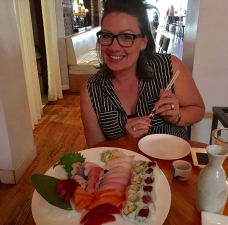What is 'American Food' Anyway? 2/17/2017
Just like our Olympic teams that are made up of diverse athletes from all cultures, races and nationalities so is the diversity of the American table. As Americans one of our favorite pastimes is taking a friend, client or guest to a favorite restaurant or inviting them over to our home to enjoy favorite recipes. When asked what type of food rarely is the reply…American food. American food? Meatloaf, mashed potatoes, kernel corn or turkey and dressing with cranberry sauce, is that what you mean?
But stop and think about it. What’s American food anyway, if it’s not made of the same essence as its people? And when is the last time you went out for an American meal? With the exception of your favorite steakhouse or hamburger joint everything else seems to be…well, in short, non-American. In other words, more and more, our pantries contain foods from across the planet. Americans have a storied past of innovation and originality. However, when it comes to food we’re the world’s greatest at borrowing seasonings, flavors, smells and textures and making them our own.
We can travel the world and sample the simple and the exotic food fare as close as our nearest grocery store or quick service restaurant. More and more we love smooth Greek Hummus and anytime is a good time for lively discussion and Vietnamese pho. We also love Cuban sandwich or Lebanese Tzatziki, which are becoming American fare. And there’s just something playful and unique about “Pass the chimichurri por favor” compared to, “Can I have some more steak sauce, please.” Especially when you can tell your friends you made it from scratch with your own special touch.
However, there’s little argument that the juggernaut in ethnic cuisine is…Mexican…no longer dismissed as a passing fad but a hard trend over the past 20 years. Grocers and manufacturers can no longer sit ideally on the sidelines contemplating what to do next.
So voracious is the American palate for Mexican food that many American homes have extended Taco Tuesday to include Thursday, Friday and Saturday, too. Before Chipotle ran into health issues their stock was soaring at seven hundred dollars a share! Even now the stock has bounced back to over dizzying four hundred dollars a share, which is pretty heady stuff for a maker of a humble burrito. There are now as many types of burritos as there are people. Mexican food is so integrated into America’s weekly menu that today’s youth hardly think of a taco as ethnic food.
As a buyer or category manager it’s important to listen to your customers. Here’s a few tips that may help as you consider transitions to accommodate changing demographics and changes in palate by an increasing curious Caucasian customer that also shops for ethnic ingredients.
- Remember, food is love. This is an easy step. Americans love food.
- Food is about experience. Food allows us to sample and explore the furthest reaches of the planet and that customer experience begins at the store.
- Lastly, it takes courage to merchandise according to cultural trends and determination to communicate the changes that are made at the shelf.


Armando Martín lives in Denver, Colorado, enjoyed a successful career in corporate America that carried him throughout Latin America. Armando co-founded the country’s first multicultural retail marketing agency, XL Edge. He currently devotes his consulting practice to multicultural strategy and retail leadership. He is also on the board of the National Hispanic Voter Education Foundation